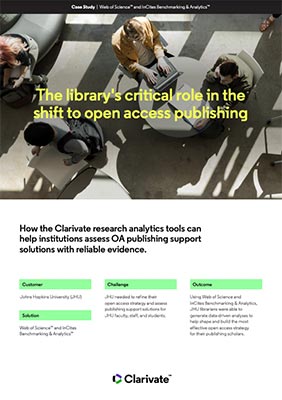InCites Benchmarking & Analytics
Research analytics for publishers
InCites Benchmarking & Analytics can help publishers with:
- Analyze the competition
- Measure journal performance
- Identify cutting-edge topics
- Promote journal metrics
- Assess open access journals
Learn how to better inform your publishing strategy
Unlock your publishing potential with research insights
Measure the effectiveness of your publication outputs on emerging research and promote your journals to increase submissions. InCites Benchmarking & Analytics is a flexible research evaluation tool that provides trusted, publisher-neutral data so you can make informed decisions about your publishing strategy.
Analyze the competition
Identify strengths, weaknesses and opportunities by benchmarking your citation performance against peer publishers. Compare citation impact, author affiliation, collaborations, funding and more.
Measure journal performance
Make confident decisions about your portfolio of publications. Measure citation performance and compare publications to understand which are most highly cited.
Identify cutting-edge topics
Use the Research Horizon Navigator module to identify trends and innovative research areas based emerging topics. Inform business proposals for new journals, societies or special issues.
Promote journal metrics
Enhance your marketing materials with publisher-neutral journal data. Leverage your citation impact to promote your journals to new authors.
Assess open access journals
Understand how university authors are using and contributing to your open access journals. Use citation and author data to inform and recommend open access agreements.
Research evaluation tools for publishers
Leverage these research evaluation tools and reports to guide your publishing strategy

Journal benchmarking
Leverage publisher-neutral data to compare your journal impact against the competition.

Publishing agreement analysis
Understand where your customer's authors are publishing, their citation impact and if they are engaging with open access journals.

Emerging research topics
Discover the new emerging research areas and experts in any field to solicit new content and article authors.
University collection analyses drive decisions about publisher agreements
Johns Hopkins University uses InCites and Web of Science data to evaluate their open access strategy in reaction to policy changes from federal funding agencies.
In August 2022, the US government released a public access memo to federal departments and agencies, a.k.a. the Nelson Memo, which advises agencies to update their public access policies to provide free, immediate (without embargo), and equitable access to research that is federally funded by Dec. 31, 2025. Johns Hopkins University needed to analyze their open access budget to ensure it was going to support their federally funded research appropriately.
Read the case study to learn more about how Johns Hopkins University (JHU) used InCites Benchmarking & Analytics to inform decisions surrounding open access publishing agreements and to help JHU scholars to demonstrate the impact of their work.

Frequently Asked Questions
InCites Benchmarking & Analytics is a research analytics tool designed to help publishers evaluate their journal performance, inform decisions business proposals for new journals, societies or special issues and recruit new authors.
Publishers can generate detailed reports on the impact of their journals which contain Journal Citation Reports indicators such as Journal Impact FactorTM (JIF)TM and Journal Normalized Citation IndicatorTM (JNCI)TM. These reports can be used in marketing materials to attract high-quality submissions and increase readership.
Open access journal agreements or transformative agreements are negotiated between journal publishers and academic institutions to cover article processing charges (APCs) and can include a shift from subscription payments to publishing payments. InCites helps publishers assess the effectiveness of these agreements so they can use them in their negotiations and offer solutions that best meet the university’s open access goals.




